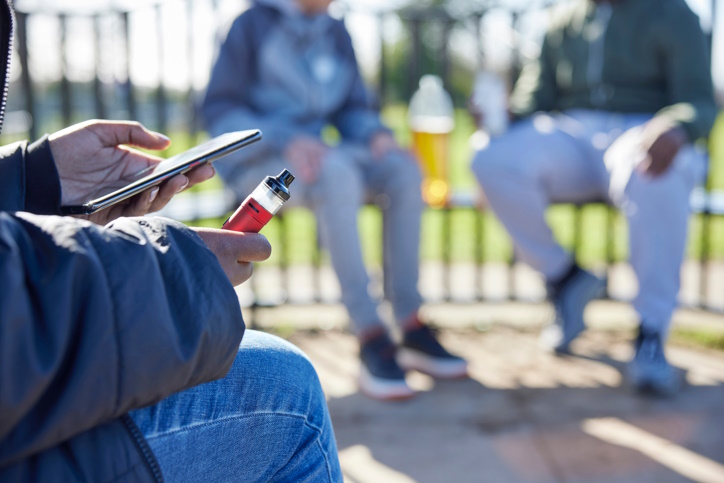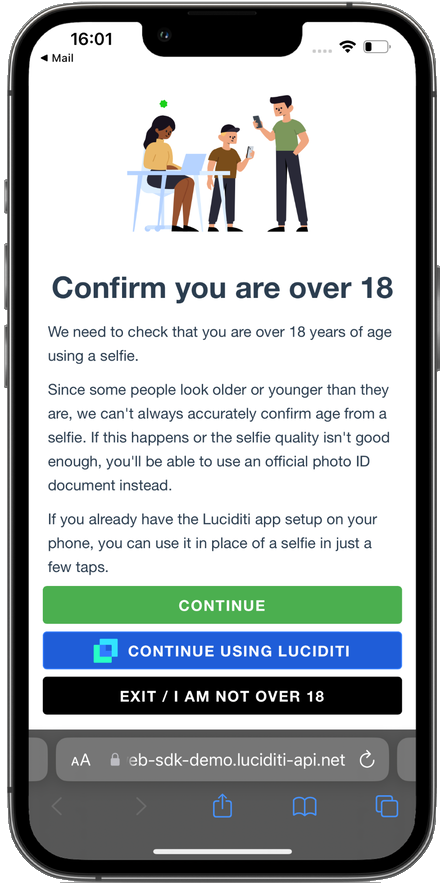Easier age assurance comes ahead of anticipated government crackdown
A smart, new plugin from Luciditi can help suppliers of online vape products stay on the right side of the law. It comes amid growing pressure to stop children accessing e-cigarettes, amid concerns about the long-term impact on young people’s lungs, hearts, and brains.
Data from campaigners Action on Smoking and Health shows that experimental use of e-cigarettes among 11-to-17-year-olds is up 50% on last year. The Royal College of Paediatrics and Child Health has repeatedly expressed concerns about the potential damage to young people’s health caused by vaping.
On June 6, the RCPCH called for an outright ban on single-use e-cigarettes. Disposable vapes can be bought for just £1.99 and are especially popular among young people. Dr Mike McKean, the RCPCH vice-president and a paediatric respiratory consultant, said concerns stem from the “epidemic” of child vaping and the small but growing numbers of children with respiratory problems.
It’s illegal for anyone under 18 to buy or use a vape in the UK. But restrictions are easily sidestepped, both on the high street and online. In April, health minister Neil O’Brien launched a £3 million ‘illicit vapes enforcement squad’, targeting high street retail. Clamping down on illicit online sales is an inevitable next step.
Ground-breaking age assurance plugin
Responsible online suppliers face a dilemma. They depend on an easy sales process where adults can quickly find and buy what they want. Simultaneously, they must also identify and exclude youngsters.
Many websites have little choice but to use a self-asserting button, asking potential customers whether they’re aged 18 or over. Kids click yes, and they’re in. It’s like a door in a nightclub where instead of doormen checking ID there’s a small sign asking ‘are you 18?’
Now, a ground-breaking plugin from Luciditi offers a proven and cost-effective alternative. The first of its kind, the plugin gives websites a reliable, quick and streamlined route to age assurance.
The Luciditi Age Assurance plugin uses AI that is currently trusted by clients in a range of age-restricted industries. Using military-grade security and built by a team whose roots can be traced to software that protects the clinical documents of two-thirds of the UK population, Birmingham-based developers Arissian.
Until now, businesses wanting to embed age assurance tech in their website have had to go the long way round, involving additional coding. Attempting this work in-house has huge implications in time and money. By downloading the Luciditi plugin for WordPress and setting up a Luciditi business account, companies looking for a simpler solution can now upgrade their age assurance without embarking on an IT project.
Simple as a selfie
“Setup is a piece of cake”, says Ian Moody, Arissian’s MD and co-founder, “once you’ve set the minimum age, and added the API key and company logo, your entire site is age-restricted.”
The plugin generates a landing page, with a greeting (written by the client) and a request for a selfie. Luciditi’s digital identity technology examines the image and estimates whether the person appears older than 18 (or whatever age you choose), in a process that takes just a few seconds. Adults are then allowed unrestricted access to the site.
Luciditi’s cutting-edge ‘liveness’ technology prevents attempts to spoof a selfie. So-called presentation attacks are weeded out by counter-measures that spot printed photos, cutout masks, digital and video replay attacks, and 3D latex masks.
“The plugin operates with minimum friction”, explains Ian Moody, “only challenging visitors for proof when necessary. Age assurance is bypassed for future visits using the same browser.”
Only people who look around the specified age are likely to be asked for proof of age. They are guided through an extra step which confirms their date of birth by supplying an image of government-approved ID. A match against the ID document photo confirms that they are the document holder. However, this data goes no further than Luciditi.
Anonymity guaranteed
Having verified a person’s age, the app then simply sends a nod of approval to the plugin without revealing any further information, it doesn’t even release the date of birth. The plugin doesn’t store selfies, biometric data that enables age-estimation, names, addresses, dates of birth, or any ID document details. Despite supplying a selfie or ID data, anyone buying vape products from a protected site will remain anonymous.
Users who have already verified their identity in the Luciditi app can access a protected website with a few taps, without needing a selfie or ID documents. Having given their data to the app, users can access any age-restricted website that relies on Luciditi’s tech, knowing that their personal details are securely protected and will never be sent to a third party.
For a modest annual subscription, paid monthly, vendors can find peace of mind knowing that they’ve put themselves and their business on the right side of the law, amid mounting pressure for action against sites that put children at risk.
A catalyst for change
The RCPH’s call for a ban on disposable vapes would bring the UK more closely in line with comparable countries. New Zealand has recently banned most disposable vapes, Australia has made vaping prescription-only, and tight restrictions have been implemented in Scotland, France, Germany and Ireland.
The RCPCH’s call came on the final day of a two-month trawl for ideas on restricting under-age vaping. The consultation, led by the Department of Health, should be “the catalyst for change that is so urgently needed”, said the children’s commissioner for England, Rachel de Souza. Ministers are now considering this new evidence ahead of potential further steps in tightening the law.
Evidence submitted to the government includes data from compliance auditing firm Serve Legal. Having conducted over 22,000 e-cigarette purchases since January 2021, in-store and online, Serve Legal found that “one in four auditors are being sold e-cigarettes without being asked for age verification or identification.”
Three days after the RCPCH’s call for a ban on disposable vapes, Rachel de Souza echoed their demand and urged ministers to crack down on the marketing of vapes to young people. De Souza said: “We urgently need stricter regulation of this ‘wild west’ market. It is insidious that these products are intentionally marketed and promoted to children, both online and offline.”
In the face of mounting pressure, it’s a matter of when rather than if the government will take tougher action against websites that continue to put children’s health at risk. Luciditi’s plugin is an easy solution for vendors who share their concern.
Want to know more?
If you would like to learn more or try out the Luciditi Age Assurance Plugin for WordPress or understand how Luciditi Age Assurance technology can help your website or business, contact us for a chat today.




